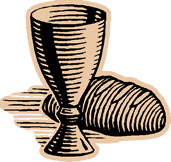
The French words baragouin and baragouiner came up in conversation yesterday and I thought I’d write about them today as they have an interesting etymology.
According to Reverso baragouin means ‘gibberish, gabble or double Dutch’ and baragouiner ‘means ‘to gibber, jabber, gabble’. The Larousse Dictionary defines baragouin as language that is incomprehensible due to poor pronunciation, vocabulary or syntax, or an incomprehensible foreign language; and baragouiner as to talk a foreign language, incorrect pronounciation, or to express something in an incomprehensible way.
According to Wikitionaire and Le Dictionnaire d’étymologie française, these words come from two Breton words – bara (bread) and gwin (wine) – things that Breton-speaking travellers often asked for from French-speaking inn keepers during the Middle Ages and which the French speakers particularly noticed. As the French speakers didn’t understand what the Bretons were saying, they associated these words with gibberish or an incomprehensible language.
It’s *Le* dictionnaire, not *La* dictionnaire.
Baragouin and baragouiner are two nice words that can be used in confidence. Typically : “mais qu’est-ce que tu baragouines, là ?”
Hmm.. “Bara” and “gwin” are actually Welsh words for bread and wine (respectively). While Breton is very similar to Welsh (having come from the same root) I didn’t think the words were quite that exactly the same.
According to Geriadur.com wine is gwin in Breton, and bread is bara – as in Welsh.
What is interesting to me, in Canada, is Double Dutch. That is a phrase meaning gibberish? I never knew. As far as here, it is jump rope using two ropes moving in opposite directions.
D.Jay – the phrase Double Dutch does indeed mean nonsense of gibberish in British English. The phrase is also used to refer to thing that are very confusing of difficult, including the jump rope (skipping) game you refer to.
See: http://www.phrases.org.uk/meanings/double-dutch.html and http://www.word-detective.com/121800.html and http://www.wisegeek.com/what-is-double-dutch.htm
The Breton version of ‘gibberish’, ‘double Dutch’ is:
gregachiñ – v. baragouiner
gregach – n. baragouin
‘Gregach’ is from greg ‘Greek’, gresineg (Greek language) and also another Breton term for baragouin, gibberish is:
saoznaj – ‘English’
Derived from saozneg (English language) saozn + suffix -aj which is the equivalent of French and English suffix -age I think?
Could this word be related to Eng bargain, Fr. barguigner from OFr. bargaignier?
Trond – bargin comes from the Old French bargaigne-r from the late Latin barcāneāre/barcāniāre, which is of uncertain origin.
Hello!
The verb ‘baragouiner’ might have a completely different origin. I’ve recently made some research about it for my own blog, and here is what I wrote:
(I’m sorry it’s in French. If you think this is interesting, I’ll do my best to translate it).
Gilles Ménage écrit dans son “Dictionnaire étymologique de la langue françoise” (1750) à l’article ‘baragouin’ :
« J’ai cru autrefois qu’il venait du mot bas-breton ‘bara’ qui signifie ‘du pain’ & de celui de ‘guin’ qui signifie ‘du vin’. Mais je ne doute plus que ‘baragouin’ n’ai été fait de ‘barbaracuinus’, diminutif de ‘barbaracus’ ».
Le terme ‘barbare’ vient du latin ‘barbarus’, lui-même emprunté au grec. Il est formé à partir d’une onomatopée qui évoque le bredouillement. Il désignait ceux qui ne parlaient pas le grec, l’étranger qui a un langage grossier (toute langue paraît grossière à celui qui ne la comprend pas). La forme en ‘–acus’ est un augmentatif et en ‘–inus’, un diminutif.
En breton, ‘baragouiner’ se dit ‘gregachiñ’, littéralement : ‘parler grec’ (‘greg’). [‘gregach’ : grec, baragouin.]
On est toujours le barbare de quelqu’un…
Thank you!
Pascal Tréguer.
[My blog, if you’re interested – a lot of articles are in English:
http://amoureuxdulangage.unblog.fr/